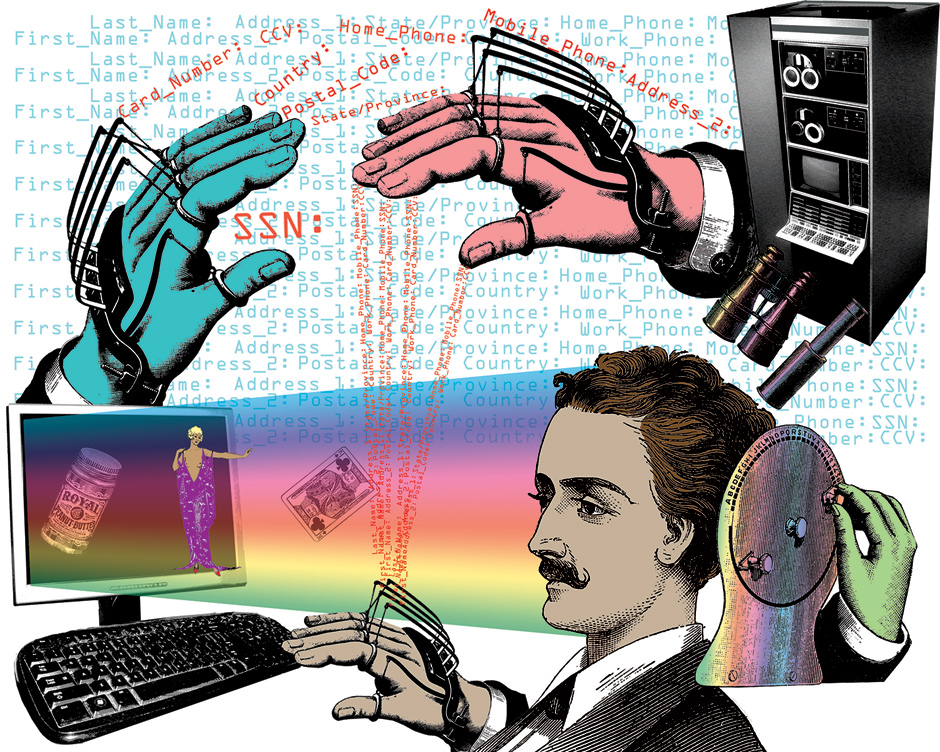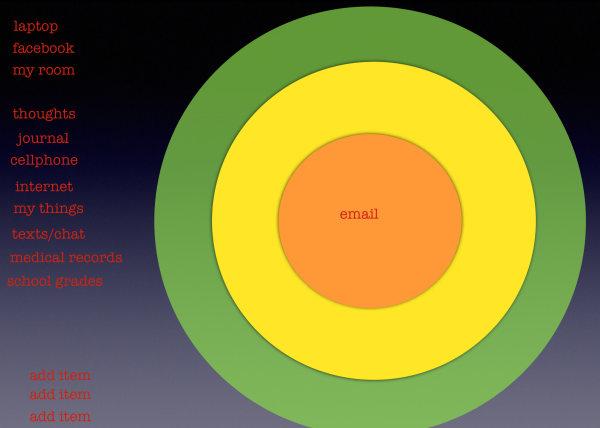Educator of the Month: Reuben Loewy, Creator of Living Online Lab
- December 9, 2015
- By Elisabeth Morgan

Even young kids want to know what happens to our minds when we go online… Having an awareness of the study of cyber-psychology affects their behavior. — Loewy
This spring highschoolers from two schools in Princeton, New Jersey, will enter a class based in history, technology, society, economy, psychology, sociology, computer science, and language… all wrapped into one. It’s a class about something so ubiquitous that it may never have occurred to many of us as something we should teach in the first place. The course is called Living Online and it’s about the magnitude of the Internet, how its hidden society works, and how it shapes our lives. Former journalist Reuben Loewy is the creator of this curriculum, which he’s taught remotely online in various high schools across the country and in Canada. He is currently part of the English faculty at Princeton Day School and a humanities teacher at Princeton International School of Mathematics and Science.
With Computer Science Education Week in full swing, many schools are looking for ways to encourage kids to become more digitally literate. One of the goals behind the week is to draw the next generation into computer science, a rapidly growing industry that is in desperate need of more hands on deck. Today’s students will change the way we communicate and work online in the future, across all industries, but many of them haven’t moved beyond the stage of casual browsing or playing games online.
”It’s one thing to use software. It’s a totally different thing to get to change how the software you use actually works,” said Alice Steinglass, Leader of Engineering at Code.org, in a YouTube clip about Computer Science Education Week.
As an extension of that idea, Loewy believes that in order to make a positive contribution to digital technology, students must have a “bigger picture” of what society they’re building into. Living Online consists of a series of lessons surrounding the nature of the digital era. Modules include topics such as online identity, the digital divide, privacy issues, disruption across industries, the digital media revolution, the economy of clicks, cyber-psychology… the list goes on. (Course descriptions can be found on the Living Online Website: www.livingonlinelab.org)
The following is a short conversation with Loewy about his experience teaching this material, as well as the parts of his curriculum he thinks are best suited for a middle school or elementary audience. Loewy lives with his family in Princeton, New Jersey.
 KD: How old are your sons? Do you teach them about the ‘digital revolution,’ and if so, how?
KD: How old are your sons? Do you teach them about the ‘digital revolution,’ and if so, how?
RL: My boys are 9 and 11, and not yet surfing independently. They do, however, use iPads for most of their school work – given to them by their school. I have walked them through most of the units of the Living Online curriculum though. They are particularly interested in digital ethics, privacy, identity, gaming in education, and artificial intelligence. They also have a basic knowledge of how the Internet works, and the fact that it is fueled by information gleaned from all users.
KD: What surprises you about what kids know about living online when they enter your class?
They really do not differentiate between being online and offline. They’re totally immersed in it in every way… But the dangerous thing is that they’re perceived as “digital natives” and that they understand it better than we do. It’s certainly not the case.
Younger kids are great at apps, installing things, setting up their iPads and software systems, and that fools parents into a false confidence. They relate it to installing the VCR or something, and they think that their children are very tech savvy… but in fact there’s a big difference in being tech savvy and actually understanding what’s going on in the Internet world.
You can look at being online in two different ways. One way is a more superficial level, which is being able to navigate, but digital technology also allows us to be participants and be producers of online material. That requires a whole new level that many schools haven’t even begun to explore.
KD: So what have you seen schools doing so far in terms of teaching about how the internet works?
RL: There’s a whole movement now on teaching digital citizenship. That’s what most of the effort that been focused on…cyber safety. Safe, savvy, and ethical is what we’re trying to teach.
But it’s beginning to shift now. [We’re moving past only discussing safety into more of an interactive analysis of our behavior online.] One of the courses I’m teaching is cyber-psychology. Even young kids want to know what happens to our minds when we go online- they’re beginning to talk about digital addiction: “What makes us addicted to our phones?”
We’re aware that something happens, but now we want to know what. In lower school or middle school, even having an awareness of a study of cyber-psychology affects their behavior.
KD: How do you mean?
RL: They are fascinated by the idea that they can adopt multiple identities. I find that many students are extremely savvy about what information they share online – they hardly ever give their real names, genders or ages when they register online for any sites.
 In middle and upper school classes I have explored with students the whole concept of privacy – from defining the term (much, much harder than one might imagine!) to looking at what privacy means for them, and how it changes over the course of ones life and circumstances. As teens, their smartphones are not surprisingly the most private thing. I developed a fun exercise for middle graders – to rank their privacy on a target. In class they can move the items on to the dartboard according to priority – so the iPhone always goes on the bulls eye!
In middle and upper school classes I have explored with students the whole concept of privacy – from defining the term (much, much harder than one might imagine!) to looking at what privacy means for them, and how it changes over the course of ones life and circumstances. As teens, their smartphones are not surprisingly the most private thing. I developed a fun exercise for middle graders – to rank their privacy on a target. In class they can move the items on to the dartboard according to priority – so the iPhone always goes on the bulls eye!
Awareness of how privacy works (or does not work) online changes their behavior accordingly, as does awareness of addiction, for example – they recognize the feeling/phenomenon and are more wary of playing games for hours – plus it makes sense now when adults warn them of online addiction. This is not just a myth for them now.
There is obviously not valid data to support this (yet) but there is plenty of anecdotal evidence to show that awareness of these issues is a huge step toward moderating behavior – as opposed to scaring kids or trying to block apps like Snapchat.
KD: What are the best practices for young people to ease into forming “online identities”?
RL: In terms of identity, children need a lot of freedom to explore. There are all sorts of good ways students can do that.
One of the things we used to scare children was the idea of a “digital footprint” … the idea that they’ll make a mistake and they’ll never be able to take anything back. Instead they should worry about creating a “positive footprint” and think about how to do that.


